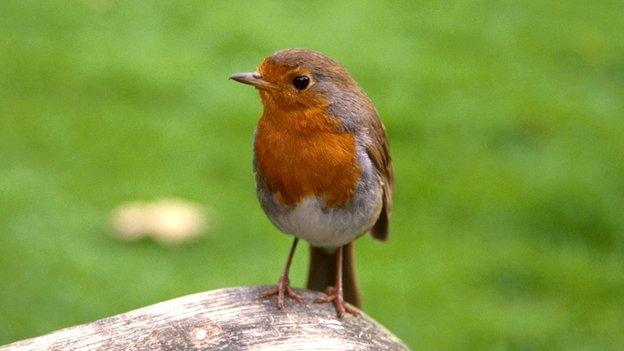Mystery of robins' nighttime singing probed
- Published

Robins could be particularly sensitive to artificial lighting
A new project at Glasgow University aims to help resolve why robins are up all night singing in cities.
Dr Davide Dominoni believes that city lights convince the birds there is no end to the day.
Robins are adapted to hunting insects in dim light, so are thought to be particularly sensitive to the effects of artificial lighting.
The researcher said blue light from neon signs was likely to be especially disruptive to the birds' body clock.
Dr Dominoni was speaking at the American Association for the Advancement of Science (AAAS) annual meeting, in San Jose, California.
He said: "I live in Glasgow now and I hear robins singing throughout the night, singing all the time. Robins are one of the most sensitive species to light."
In order to investigate the phenomenon, Dr Dominoni is putting cameras in nesting boxes to find out when robins sleep.
But the reasons for the robins' nocturnal singing have been a subject of some debate. Other researchers have proposed that the birds predominantly sing at night in urban areas because it is too noisy during the day, external.
Either way, Dr Dominoni says that singing through the night could be affecting the birds in adverse ways.
"This brings us to some of the physiological costs that that these environmental pressures might have.
"Singing is a costly behaviour, it takes energy. So by increasing their song output, there might be some energetic costs."
He continued: "I think we should reduce the intensity of the light we put out, reduce the amount of light and try to think about the spectrum of the light we are putting out.
"In some cases, we can try to modify the street lamps, by putting shields on top to reduce light pollution."